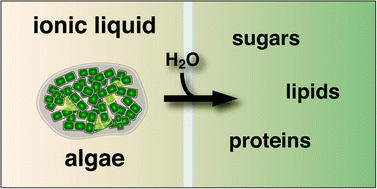Microscopic algae occupies every photic niche on Earth and provides an efficient and inherently scalable sunlight energy capture and chemical storage mechanism. However, fuel production from algae remains outside economic viability due to limitations in biomass cultivation and feedstock extraction. In particular, extraction strategies require prohibitive energy inputs to breach the cell wall and separate lipids, while underutilizing polysaccharide- and protein-rich leftovers. Also due to focus on lipids, cultivars become either unstable or unproductive. Meanwhile, recent advances have demonstrated the synthesis of a variety of fuels and other chemicals from sugars and proteins. Here, the energy-efficient deconstruction of algae cell walls, resulting in release of cell contents, is reported. This occurs by dissolution and hydrolysis of wet algae biomass in ionic liquids without acids, bases or other catalysts. Deconstruction reached completion in <50 min regardless of algae species, at 100 to 140 °C and atmospheric pressure. Based on this finding, a simple process that converts wet algae biomass into constituent fractions is proposed and modeled. These results show it is possible to eliminate intensive energy demand currently hindering the economic viability of algae while co-producing sugar and protein feedstocks that tie into emerging fuel and chemical conversion paths.

You have access to this article
 Please wait while we load your content...
Something went wrong. Try again?
Please wait while we load your content...
Something went wrong. Try again?


 Please wait while we load your content...
Please wait while we load your content...